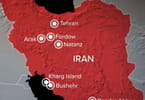Yes, it’s part of the United States of America, but it’s 10 time hours and more than 20 hours travel time away from the U.S. Capital Washington DC. It’s located in the Western Pacific Ocean close to Philippines, Japan, Taiwan, China, Russia and Guam – this it a group of small islands called the Commonwealth of the Northern Mariana Islands also known as CNMI.
Travel and tourism is big business in this U.S. territory, but had been experienced one crisis after another.
A big casino project may now put CNMI on the horizon of Chinese gamblers.
Without foreign workers CNMI would be out of business when it comes to the hospitality industry.
Americans wouldn’t move here from the mainland, but Philippine guest-workers are in CNMI in great numbers. Manila is only a short 2 hour flight away.
Now the United States government is about to put this remote U.S. territory out of business in saying a federally mandated immigration cap was reached and deportation are about to start.
Foreign workers include maids, drivers, managers, skilled workers, many of them have minor U.S. citizen children and made the island of Saipan or Koror their home for many years.
Today the Saipan Tribune explains it:
Pressing concern from business and government leaders grow on what this means to longtime businesses and families affected by this limit on contract worker permit renewals, after the federal government announced on Saturday it had reached its cap of contract worker permit applicants for this fiscal year.
To address what they call a “crisis,” private and public sector leaders met and are forwarding their concerns to the federal government through Gov. Ralph DLG Torres and the Office of Delegate Gregorio Kilili C. Sablan (Ind-MP). Torres and Sablan met with private sector leaders like Tan Holdings president Jerry Tan, DFS president Marian Aldan Pierce, Hotel Association of the Northern Marianas Gloria Cavanagh, and other heads of the local human resources organization, among other business leaders, yesterday to hear their concerns.
The U.S. Citizenship and Immigration Services on Saturday had announced it had reached its 12,999 cap on number of contract worker permit applications, and it would reject applications received after a close-off May 5 date, including those for extensions of stay for current contract workers.
The major concern appears to be with procedure.
USCIS said Saturday that if an extension petition is rejected, then the beneficiaries listed on that petition are not permitted to work beyond the previous permit, and that the affected and petitioned family members, must depart the CNMI within 10 days after the their permit expired, with no hint of extension or grace period offered.
But how will USCIS manage a renewal process for a program that has never reached its cap? What, if any, are its guidelines on what permits it will prioritize first? What happens to the families of those affected? among many others, are questions that officials have asked.
“As this is the first time the CW cap has ever actually been reached since the federal takeover of our immigration, we are seeking clarification on a number of issues from USCIS so that businesses in the CNMI can obtain a clear understanding of our current labor environment,” said the Torres administration in a statement yesterday. “We will continue to work to assess the overall economic impact of this current limitation on foreign workers.”
“We believe it’s a crisis,” said Tan Holdings vice president Alex Sablan yesterday, one of the several private sector officials who convened at the Office of the Governor yesterday to air their concerns with the delegate’s and governor’s office.
“We believe that the recent decision by USCIS to issue a notice that requires individual under renewal”—to leave the CNMI if their extension petition is rejected or renewal is denied “because the quota has been met”—“is a crisis in its own right because we are going to be uprooting longtime employees, families, people have no ability to renew because we’ve got new permits in the pipeline and they could possibly fill their gap,” he said.
Alex Sablan also wants to know if USCIS is going to be able to manage a renewal process for existing workers that have been here “for years on end and how is that going to be managed under a system that now has met its quota.”
“The quota’s never been met so they have been able to manage this in-and-out process without any regard to the FIFO [fly-in fly out policy]. As it plays out, it looks like it’s going to be a first in, first out, we don’t know. So we are asking.”
Delegate Sablan, for his part, expressed dismay over the breach of cap, and pointed to another visa class option available to new project developers.
“For months I have been saying that the new developers should use H2B visas for construction workers. The governor and some business leaders have been saying the same. Yet here we are. We have reached capacity in the CW program barely eight months into the fiscal year. That the Northern Marianas has reached the CW cap should come as no surprise to no one. Perhaps the surprise for some is that it came so soon,” Sablan told Saipan Tribune.
“So what now? What happens to those current workers who come up for renewal over the next few months, and the businesses that depend on them? What happens to the families of these workers? The congressional office has reached out to USCIS with these questions. We are trying to get a handle on how people are affected. We have proposed some ideas. Some of these questions and ideas will take time to research. We will stay on top of this issue, and continue to explore options that will help address the workforce needs and humanitarian concerns that we anticipate at least in the near term,” he added.
Delegate Sablan also threw concern to what might come next fiscal year, which begins in October.
“…What about 2019, when the CW program expires? It is called a transition program for a reason, and will come to an end. We have to make that shift to U.S. workers and to other categories. We have to also think seriously about the bigger picture, about the kind of development we want here in our Northern Marianas. And we have to be real about the kind of development we can sustain,” he said.
‘More concrete procedures’
Rep. Angel Demapan (R-Saipan) yesterday, for his part, slammed USCIS for what he called “late” notice on the deadline to file the CW-1 petitions.
Demapan, who chairs the House committee on federal and foreign affairs, said USCIS should come up with “more concrete procedures” on how to address the numerical limit for CW workers in the Commonwealth.
“It’s very disturbing to see that all along USCIS knew that the numerical limit for CW workers is 12,999, and yet still waited for late May to announce that they will reject CW-1 petitions filed after May 5th,” said Demapan. “Having known that the hard number is 12,999, USCIS should have been able to project reaching the cap ahead of time so that businesses could have been afforded ample time to plan ahead.”
The late notice regarding the cap, Demapan said, along with USCIS’ statement that workers whose petitions are rejected must exit the CNMI within 10 days is “absolutely absurd.”
USCIS failed to consider, he said, those CW-1 workers with CW-2 derivative family members in implementing the 10-day window to exit.
“Under U.S. Public Law 110-229…U.S. Congress intended to minimize, to the greatest extent practicable, potential adverse economic and fiscal effects of phasing-out the Commonwealth’s nonresident contract worker program and to maximize the Commonwealth’s potential for future economic and business growth,” Demapan said, quoting the provisions of the federal law that mandated an end to the CNMI contract worker program, the lifeblood of its economy.
“However, what we are seeing as of late are policy decisions that contradict the intent of Congress.”
Businesses in the Commonwealth have already been adversely affected by the shortage of workers resulting from delays in CW processing at that start of this year, which left hundreds from working and forced businesses to close down.
Demapan says USCIS should have a “taken cue” and ensure that businesses were not made to go through the same hardship again.
Still, Demapan noted, the challenges we’re seeing today should also be viewed as an opportunity for the Commonwealth and for businesses have long been around to make its case to the U.S. government with regard to the hurdles we face in building our U.S.-eligible workforce capacity.
“We must continue to encourage businesses to search for qualified U.S.-eligible workers,” said Demapan. “And if it continues to be difficult for businesses to find such U.S.-eligible workers, then the business community and the government can extrapolate that data so that the U.S. government can see that even with increased efforts to employ U.S.-eligible workers, the labor pool is simply not within reach.”
With CW numerical limits is expected to decrease annually until the end of the transition period, Demapan says the Commonwealth can expect to be reaching its annual CW cap much sooner every year.
“I will continue to work with the administration and key officials from both the public and private sector to explore all our options moving forward,” added Demapan. “With our economy showing promising signs of improvement, it is imperative that we all come together and hash out a comprehensive plan to effectively manage the pace of economic development in the Commonwealth.”
902 okwu
The current CW crisis comes at a time when the Torres administration prepares for direct consultations with President Barack Obama’s representative on ongoing issues with the Commonwealth.
The more pressing issue is that of the contract worker program, which expires in 2019, and is seen is as the issue that will take primacy with these talks with the White House designated representative Esther Kia’aina, the assistant secretary of the Interior for Insular Areas. The other issue requested for consultation on is the advancing military projects in the NMI.
The Torres administration pointed toward these talks, in a statement on the CW crisis yesterday. The administration has begun drafting letters to those it will seek from the public and private sector serve on the CNMI’s side on the 902 panel. They expect there to be separate panels for the immigration and military issues, with some members overlap, Saipan Tribune gathered yesterday.
“The labor requirements of our economy is an absolute priority to the administration,” the administration said in its statement. “More than seven months ago the CNMI initiated consultations under Section 902 process in anticipation of circumstances like this and now with the President’s representative selected we are ready to begin this important dialogue to ensure that our economy is given the opportunity to succeed.
“We want to do whatever we can to keep families with CW household members whole and intact and to address the concerns of our business community.
“We can anticipate that there will be difficult times of uncertainty ahead for many, but the administration is joining with our private sector counterparts and other elected officials to push for a solution to this situation that is beneficial to our economy, and all of our residents that call the CNMI home.”
Torres and the 902 panel are expected to negotiate with the Kia’aina on a foreign worker program package that can be approved by U.S. Congress with the President’s backing to meet the CNMI’s need.
Some stakeholders have recommended a permanent foreign worker program while others tout an extend program for 15 years, with a cap of 15,000 workers to be more feasible.
IHE Ị GA-Ewepụ na edemede a:
- “We believe that the recent decision by USCIS to issue a notice that requires individual under renewal”—to leave the CNMI if their extension petition is rejected or renewal is denied “because the quota has been met”—“is a crisis in its own right because we are going to be uprooting longtime employees, families, people have no ability to renew because we've got new permits in the pipeline and they could possibly fill their gap,” he said.
- “As this is the first time the CW cap has ever actually been reached since the federal takeover of our immigration, we are seeking clarification on a number of issues from USCIS so that businesses in the CNMI can obtain a clear understanding of our current labor environment,” said the Torres administration in a statement yesterday.
- USCIS said Saturday that if an extension petition is rejected, then the beneficiaries listed on that petition are not permitted to work beyond the previous permit, and that the affected and petitioned family members, must depart the CNMI within 10 days after the their permit expired, with no hint of extension or grace period offered.






















